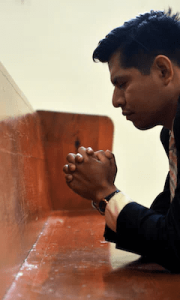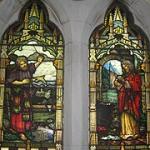
When Jonah finally accepted his calling to cry repentance to the people of notoriously wicked Ninevah, all of them—including the king (and at the order of the king)—fasted in sackcloth and ashes. God accepted their repentance and their petition; the city was saved. Today some people dread fasting as a time of affliction—a monthly sackcloth and ashes. This is not the Lord’s intent (Isaiah 58:3-11); Ninevah was extreme. Fasting is a
form of sacrifice, balanced abundantly in our favor as a time of blessings and renewal.
Opportunities for Firmness and Strength
The word “fast” is derived from Germanic fastuz, meaning “firm.” The equivalent entered English with the meaning of “firmly fixed”—related to “restrained” or “immovable.” Fasting has been and should be a time of striving to be immovable against sin and temptation.
Fasting was well known in Ninevah and throughout biblical cultures and events. Fasting gives the Lord a time of humility and devotion with His servant(s), enabling Him to strengthen them for their future lives and missions.
Moses and Elijah fasted, receiving firmness and strength for the service to which they were called. Daniel included sackcloth and ashes in his fasting as he undertook the mission he would serve in Babylon.
Esther’s cousin, Mordecai, fasted in sackcloth and ashes when his refusal to bow to the heathen king’s idol threatened mass destruction of the Jews. As Esther was to risk her life before the king to save her people, she, her maidens, and all the local Jews fasted and prayed for three days.
One opportunity of fasting is to take control of “the natural man,” to invite the presence and intervention of the Holy Spirit.
Paul taught that in our time of meeting with others after fasting and praying, Satan would not be able to tempt us to engage in corruption or carnality (1 Corinthians 7:5).
Sackcloth and ashes are no longer involved, but the Lord expects latter-day members of the Church of Jesus Christ to “continue in prayer and fasting” (D&C 88:76).
The monthly fast practiced by Church members may be a time of renewing confidence in the strength which blesses us.
Time of Prayer and Worship
Preparing to begin His mission, the Savior fasted as he communed with His Father in the wilderness for 40 days and 40 nights (Luke 4:1–4). Some people who fast today tend to minimize the all-important communing with the Lord, emphasized by the Savior and the prophets and role models of scripture as vital in a time of fasting.
Joseph B. Wirthlin, a beloved former apostle, addressed those who misunderstand. “Without prayer . . . [fasting is] simply going hungry. . . . we must lift our hearts, our minds, and our voices in communion with our Heavenly Father.” Fasting must be “coupled with mighty prayer” (1986).
Elder Shayne M. Bowen of the Seventy (2009) mentioned ways to prepare for this time of coupling, including meditation on the purpose for the fast, explained to God in a kneeling prayer.
During the fast, Elder Bowen recommended praying with gratitude, focusing on “reverent contemplation.” To conclude, he suggested another kneeling prayer, which should include a commitment and plan for improvement.
A fast day hymn by Paul L. Anderson (1981) captures the sacred nature of this blessed experience.
This fast, dear Father, sanctify— Our faith and trust in thee increase. As we commune and testify, May we be filled with joy and peace.
Blessings of Fasting and Prayer
Many promises and blessings come from times of fasting and prayer. Esther and her people were spared. Daniel and his companions were saved from lions, fire, and kings who received warnings they couldn’t understand.
Through Isaiah ( 58:8–9), the Lord promised.
Then shall thy light break forth as the morning, and thine health shall spring forth speedily: and thy righteousness shall go before thee; the glory of the Lord shall be thy rearward. Then shalt thou call, and the Lord shall answer; thou shalt cry, and he shall say, Here I am.
Inspiration and comfort often bless a time of fasting and prayer.
As the sons of King Mosiah left for their mission to the Lamanites, they fasted and prayed to the Lord to give them “a portion of his spirit,” to remain with them as they attempted to bring dangerous, violent people to understand the truth that could transform their lives. The Lord visited them, comforted them, and predicted their success, though not without hardship (Alma 17:9-11).
Another blessing from a time of fasting came as Alma fasted and prayed for knowledge and understanding when he desired and/or needed it.
Jesus later explained to his disciples that some kinds of spirits could be cast out only with fasting and prayer.
Fasting by individuals, families, wards, and others has healed many who were ill or injured, including some disabled at birth. Not all requests are granted, as God’s knowledge and will may not enable them.
Many many years ago, a father learned that his baby daughter was born blind. At that time no cure, even surgical, could correct the condition. The father declared that he would keep fasting and praying until the child received her sight.
The Lord revealed to this distraught father that blindness was related to the life plan for this child. Fasting and prayer had been answered, though not in the way the young father had hoped. But he was at peace.












